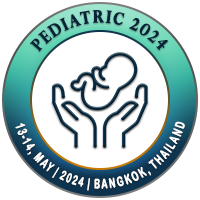
Valeriy Mukhortykh
The Federal Scientific and Clinical Center for Children and Adolescents of the Federal Medical and Biological Agency, RussiaTitle: The relationship of atopic dermatitis and food allergies in young children in clinical practice
Abstract
Relevance: Atopic Dermatitis (AtD) is a chronic inflammatory skin disease with a high prevalence among children. One of the reasons for the development of AtD is considered food allergy (FA), in connection with which children are prescribed long-term elimination diets with the exclusion of major food allergens, which ultimately leads to a violation of the nutritional status of the child and the development of protein and energy deficiency.
Objective: To assess the significance of FA in exacerbations of AtD in young children.
Methods: The study included 45 children with AtD aged 1 to 3 years with varying degrees of severity of AtD according to the EASI index. All children underwent immunological examination to determine the levels of specific IgE (sIgE) to food allergens by ImmunoCAP. According to the results of the examination, a diagnostic elimination diet was prescribed with the exclusion of a causally significant food allergen for 1 month. The decision to continue or discontinue the elimination diet was made individually, based on the results of the effectiveness of the diagnostic elimination diet.
Results: All parents associated exacerbations of AtD with food intake, although clinically FA of the immediate type was observed in only 7 patients (15.5%). Increased levels of sIgE to food were detected in 37 children (82.2%) and reflected a different (from low to very high) degree of sensitization. The diagnostic elimination diet with the exclusion of suspected foods was effective in only 15 children (33.3%). Only these children were recommended to continue the therapeutic elimination diet for a period of 6 months, which resulted in a significant improvement in the clinical manifestations of AtD. For the remaining 30 patients with the ineffectiveness of the diagnostic diet, a therapeutic elimination diet was not indicated, even against the background of existing food sensitization.
Conclusions: Only 33.3% of children with AtD had FA, which was confirmed by a diagnostic elimination diet. Even the positive results of an allergological examination have low prognostic significance in assessing the role of FA in AtD. The therapeutic elimination diet in patients with AtD should be prescribed individually, based on the results of a trial diagnostic diet.
Biography
Valeriy Mukhortykh completed his PhD at the age of 32 years from Medical University, Russia, Moscow. He has over 70 publications, and his publication h-index is 4. He currently works as an associate professor and researcher at the Department of Pediatrics and Pediatric Surgery.

